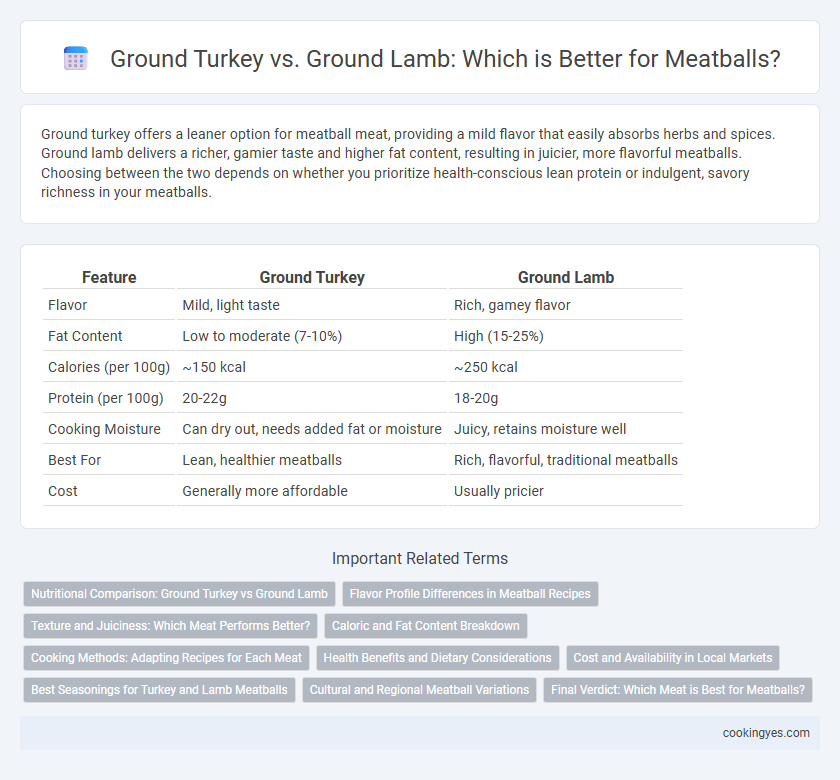Ground turkey offers a leaner option for meatball meat, providing a mild flavor that easily absorbs herbs and spices. Ground lamb delivers a richer, gamier taste and higher fat content, resulting in juicier, more flavorful meatballs. Choosing between the two depends on whether you prioritize health-conscious lean protein or indulgent, savory richness in your meatballs.
Table of Comparison
| Feature | Ground Turkey | Ground Lamb |
|---|---|---|
| Flavor | Mild, light taste | Rich, gamey flavor |
| Fat Content | Low to moderate (7-10%) | High (15-25%) |
| Calories (per 100g) | ~150 kcal | ~250 kcal |
| Protein (per 100g) | 20-22g | 18-20g |
| Cooking Moisture | Can dry out, needs added fat or moisture | Juicy, retains moisture well |
| Best For | Lean, healthier meatballs | Rich, flavorful, traditional meatballs |
| Cost | Generally more affordable | Usually pricier |
Nutritional Comparison: Ground Turkey vs Ground Lamb
Ground turkey meatballs offer a leaner option with approximately 170 calories and 8 grams of fat per 3-ounce serving, making them suitable for low-fat diets and heart health. Ground lamb provides a richer flavor and higher fat content, with around 250 calories and 20 grams of fat per 3-ounce serving, along with increased levels of vitamin B12 and zinc. Choosing between ground turkey and ground lamb for meatballs depends on dietary goals such as calorie control, fat intake, and nutrient preferences.
Flavor Profile Differences in Meatball Recipes
Ground turkey offers a mild, lean flavor that absorbs spices and herbs well, making it ideal for lighter, herb-forward meatball recipes. Ground lamb provides a richer, gamier taste with a higher fat content, enhancing the meatballs' juiciness and complementing bold, Mediterranean spices like cumin and rosemary. Choosing between the two depends on desired flavor intensity and texture in meatball preparation.
Texture and Juiciness: Which Meat Performs Better?
Ground lamb offers a richer, more succulent texture due to its higher fat content, making meatballs juicier and tenderer compared to ground turkey. Ground turkey, being leaner, results in firmer meatballs that can sometimes dry out without added moisture or fat. For meatballs prioritizing juiciness and a tender bite, ground lamb performs better than ground turkey.
Caloric and Fat Content Breakdown
Ground turkey meatballs typically contain fewer calories and less total fat compared to ground lamb, making them a leaner option for calorie-conscious diets. Ground lamb provides a richer fat profile, including higher saturated fat content, which adds to its moistness and flavor but increases overall calorie density. Choosing ground turkey can significantly reduce fat intake while maintaining adequate protein levels, favoring lower-calorie meal preparations.
Cooking Methods: Adapting Recipes for Each Meat
Ground turkey meatballs benefit from gentle cooking methods like baking or pan-searing over medium heat to prevent drying out, while ground lamb meatballs can withstand higher heat and longer cooking times due to their higher fat content. Incorporating moisture-retaining ingredients such as breadcrumbs and eggs enhances tenderness in turkey meatballs, whereas lamb's richness allows for bolder spices and robust cooking techniques like grilling or broiling. Adjusting cooking time and temperature ensures optimal juiciness and flavor retention specific to each meat type in meatball recipes.
Health Benefits and Dietary Considerations
Ground turkey provides a leaner option for meatball meat with lower saturated fat and calorie content, making it ideal for heart health and weight management. Ground lamb contains higher levels of omega-3 fatty acids, iron, and zinc, supporting immune function and muscle repair but comes with increased saturated fat. Choosing between ground turkey and ground lamb depends on dietary goals, where turkey suits low-fat diets and lamb offers richer nutrient density for balanced nutrition.
Cost and Availability in Local Markets
Ground turkey offers a more economical choice for meatball recipes, often priced lower than ground lamb, making it accessible for budget-conscious shoppers. It is widely available in most local supermarkets and grocery stores, ensuring easy procurement with consistent supply. Ground lamb, while flavorful, tends to be pricier and less readily found in standard markets, often requiring visits to specialty butcher shops or ethnic grocery stores.
Best Seasonings for Turkey and Lamb Meatballs
Ground turkey meatballs benefit from bold herbs like sage, thyme, and parsley paired with garlic and onion powder to enhance their mild flavor, while ground lamb meatballs are best seasoned with robust spices such as cumin, coriander, and smoked paprika, along with fresh mint or rosemary for a rich, savory profile. Incorporating lemon zest and chili flakes can brighten turkey meatballs, whereas lamb meatballs thrive with a touch of cinnamon and allspice to complement their natural gaminess. The seasoning choices directly impact the overall taste, texture, and authenticity of meatball recipes featuring these two distinct meats.
Cultural and Regional Meatball Variations
Ground turkey meatballs are popular in American and Middle Eastern cuisines, offering a leaner, milder flavor often paired with herbs like parsley and cumin, reflecting the health-conscious trends in these regions. Ground lamb meatballs are traditional in Mediterranean and Middle Eastern dishes, prized for their rich, gamey taste enhanced by spices such as coriander and mint, embodying the cultural heritage of countries like Greece, Turkey, and Lebanon. These regional variations influence texture, seasoning, and serving styles, showcasing how ground turkey and ground lamb cater to diverse culinary traditions within meatball recipes.
Final Verdict: Which Meat is Best for Meatballs?
Ground turkey offers lean protein with a mild flavor ideal for lighter meatballs, while ground lamb provides a richer, more robust taste and higher fat content that yields juicier, more flavorful meatballs. For a balance of health and taste, combining both meats can create meatballs with optimal moisture and savory depth. Ultimately, ground lamb is preferred for traditional, bold-flavored meatballs, whereas ground turkey suits those seeking a healthier, lighter alternative.
Ground Turkey vs Ground Lamb for Meatball Meat Infographic

 cookingyes.com
cookingyes.com